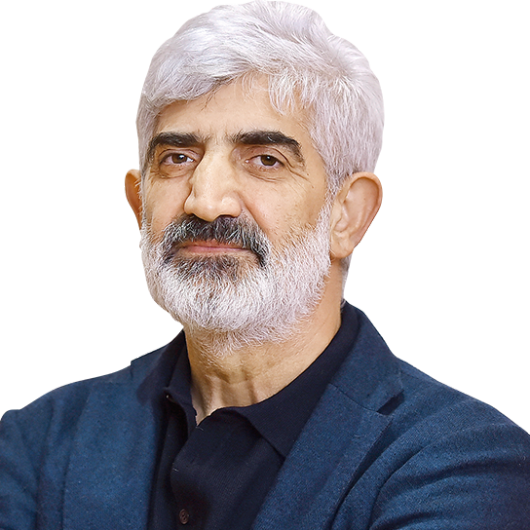
- 29.01.2025, Wednesday
- 01:31
Neoliberals and Globalists both suffered defeat after Trump victory
00:0110/11/2024, Sunday
Next article
İhsan Aktaş

The U.S. election has ended, and the world will feel its political impacts for a long time. A worldview that has led humanity into chaos, tampered with human genetics, normalized perversions while declaring the natural as illegitimate, and distanced itself from all values, has taken a significant hit. This Zionist globalist mindset, built on Jewish supremacist ideology, may sometimes seem like a conspiracy theory, but the American people made a decision that prioritized their own interests over
The U.S. election has ended, and the world will feel its political impacts for a long time. A worldview that has led humanity into chaos, tampered with human genetics, normalized perversions while declaring the natural as illegitimate, and distanced itself from all values, has taken a significant hit.
This Zionist globalist mindset, built on Jewish supremacist ideology, may sometimes seem like a conspiracy theory, but the American people made a decision that prioritized their own interests over this elite group. The fact that the whole world held its breath following the U.S. election night shows that the resulting shift won’t be confined to the U.S. alone, and will likely bring about serious changes in other countries too.
**Why Did American Pollsters Get It Wrong?**
In the U.S., only about 15% of the population follows global media outlets like CNN, Fox, CNBC, Bloomberg, New York Times, and Washington Post. Although this media has significant influence over America’s elite and those who track world events through these outlets, they don’t reach the majority of Americans. A similar misjudgment occurred when Trump was first elected; apart from a few small research teams, everyone predicted a win for Hillary Clinton.
This global media influence extends beyond U.S. outlets to audiences worldwide who also follow these platforms. The alignment between the majority of polling companies, leaning toward the Democrats, also blurs the line between media and polling sectors.
A similar situation occurred during Türkiye’s recent presidential election. Nearly 20 polling firms and left-leaning, Kemalist media figures claimed Kılıçdaroğlu would win with around 55-60%, showing a similar alignment with their preferred outcome.
Three critical issues affecting the election—economy, immigration, and the impact of the Gaza conflict on Democratic voters—weren’t sufficiently analyzed. Additionally, the threat posed by the LGBT lobby to the family structure went unnoticed.
**How Will Trump’s Win Affect Europe?**
Trump is expected to focus directly on U.S. domestic matters and pay little attention to Europe. Before Biden’s tenure, Europe was in disarray. While Biden tried to unify Europe, the heavy cost of the Ukraine war became the price of this unity. A closer relationship between Germany, France, and Türkiye may be on the agenda in this period. If the Ukraine war ends, Germany-Russia relations could regain momentum, but European nations' geopolitical decline seems likely to continue.
**What Will Change on the Foreign Policy Chessboard?**
Trump will avoid conflict with Russia while increasing pressure on China and Iran. His focus will be on China due to economic and global competition. He may also revive initiatives like the $500 billion arms sale to Saudi Arabia and Gulf countries. Strengthening the “India card” against China could also become a focus, with India's BRICS membership positioning it uniquely in this game.
**Tough Days Ahead for the PYD**
If the Ukraine war can be ended under Trump’s "world without war" policy, a consensus may emerge in Syria between the U.S., Türkiye, and Russia. How Iran will respond in this scenario remains uncertain. Iran’s chaos theory is unraveling; its strategy of keeping neighbors in turmoil now poses a larger threat to Iran itself. Supporting the stability initiatives launched by Türkiye and Iraq seems inevitable for Iran.
**Family Values Will Gain Strength**
The strengthening of the LGBT lobby during the Biden era was seen as a serious threat to humanity. Resistance from leaders like Putin in Russia, Orban in Hungary, and Erdoğan in Türkiye helped slow this momentum. In the U.S., family backlash sparked intense debates in schools. This situation is expected to lead to a shift towards prioritizing family values post-Biden.
We visited Ersin Çelik, one of the commentators of Türkiye's GENAAR report, along with sociologist Nevzat Çelik, who has published the book *Cafe et Jardin Turc’un Serüveni* with Ketebe Publishing. At that time, Ersin was working on his daily article. He shared his thought-provoking headline with us: "From Today, Men Won’t Be Giving Birth," which captured the situation perfectly in one sentence.
**U.S.-Türkiye Relations**
In the past four years, Türkiye hasn’t retreated from its ambition to be a regional power. It’s essential to evaluate how relations with the U.S. will shape up after these elections in a calm, analytical way.
In conclusion, it seems the U.S. election will not only impact America but also open doors to changes across many areas worldwide. Let’s see what the future holds.
#Trump
#Biden
#Changes
#Policy
#Türkiye
#Relations
LEGAL NOTICE
The BIST name and logo are protected under the "Protected Trademark Certificate" and cannot be used, quoted, or altered without permission.All rights to the information disclosed under the BIST name are entirely owned by BIST and cannot be republished. Market data is provided by iDealdata Financial Technologies Inc. BIST stock data is delayed by 15 minutes.
